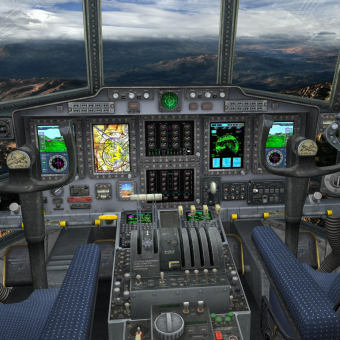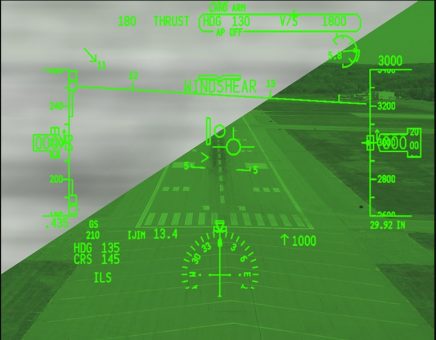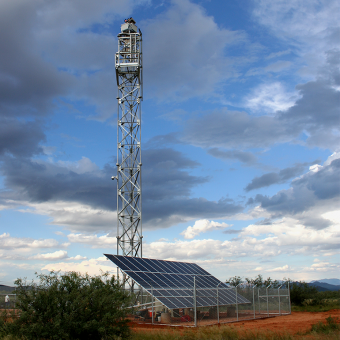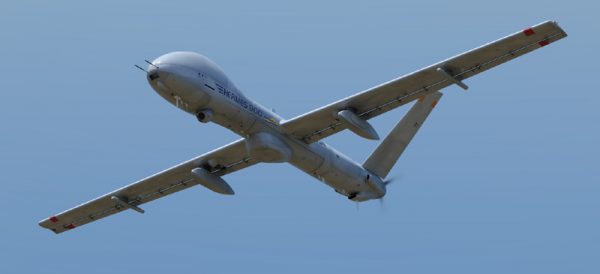Spotlight Elbit Systems: The Brains Behind Border Security
February 22, 2019Pilots used to say, “speed is life.” But things have changed, says former F-15 pilot Bob Edmonds, now of Elbit Systems, in a recent white paper. Today, “information is life.” Because for military pilots, lack of data can lead to spatial disorientation, or worse, fatalities. Most flight systems use “heads-down” map and data displays which are tough to parse through when you need to look up to fly the plane and fight.

Cockpit system. Credit: Elbit Systems.
To solve this problem, Israel’s Elbit Systems is using sensors, augmented reality and artificial intelligence to design a new 360-degree helmet-mounted display that creates “‘a protective sphere of situational awareness of incoming aircraft and missile threats.’ A pilot looking down will effectively see straight through the floor of the plane. The critical intel appears … right before the pilot’s eyes … stabilized against the real-world backdrop,” according to the white paper.

Heads-up display. Credit: Elbit Systems.
“Having every phone book in the world is different from someone handing you a telephone number,” says Mark Hodge, another former F-14 pilot turned Elbit executive in the same report. “We are very good at using sensors and links to collect data … now that data will increasingly be something the pilot can use, rather than something he or she has to process.”
From its headquarters in Haifa, Israel, and subsidiaries in Fort Worth, Texas, and around the world, Elbit Systems develops and integrates products for defense and homeland security. In addition to military aircraft and unmanned vehicles, the firm builds command, control, communications and intelligence systems, including the “Digital Army” system of networked operations for land forces.
Its most visible project at the moment is a cluster of 55 surveillance towers at the Nogales, Arizona, area of the US-Mexico border. Deployed in 2015 for the US Customs and Border Protection agency with more installations in 2016 and 2017, the towers cover a total of 200 miles, providing about 2,500 square miles of surveillance. Using radar, cameras and sensors, the towers quickly transmit data to a command center to provide situational awareness to patrol agents. In 2016, Government Security News awarded the project Most Notable Border Security Program. Elbit says the towers are designed to complement existing barriers and has been reported to be in the process of expanding on the original contract given recent focus on border infrastructure, though the company has not confirmed these reports.

Integrated Fixed Towers in Arizona. Credit: Elbit Systems.
Consistent with the geopolitical uncertainties of recent years, Elbit has observed a shift among its customers, whose priorities have changed in response to new low-intensity conflicts between nations, ongoing terrorist activities, and tighter budgets. Elbit has embraced the change, adapting its intellectual property and approach to solve customer needs. More than ever, for Elbit this means upgrading existing platforms to add new capabilities within limited budgets.
A focus on anticipating customer needs is not new for Elbit. Its emphasis on improving existing systems has been a key factor in its growth since the firm’s founding in 1966. In our work identifying the most innovative companies in the world, we separate the leaders from the followers by looking at our intangible-adjusted data, where Elbit Systems ranks No. 3 for R&D spend among industrials companies in the developed world.*
Usually, when we dig deeper in our research, we find qualitative data to match our findings, and Elbit is no different. Indeed, half of Elbit’s total workforce is engaged in research, development and engineering. In addition, most of the firm’s business line and program managers also have engineering backgrounds. This allows Elbit’s R&D teams to maintain focus on emerging technologies. For example, teams use a “fast prototyping” process for design and development that allows teams to spec requirements that automatically transfer into software code. Elbit receives grant funding and collaborates with academic groups on new “building block” projects, such as its work with machine learning and artificial intelligence on cyber protection tools for infrastructure and enterprises.
The firm owns hundreds of living patent families in Israel, the US, Europe and other countries. A significant portion of intellectual property assets relate to unique applications of advanced software-based technologies, development processes and production technologies. Some are protected by patents and some are considered “trade secrets.”
Elbit’s American subsidiary holds a Special Security Agreement with the US Department of Defense, enabling it to participate in US programs. The conditions of the SSA require Elbit of America to include outside board members who have no interest in the company, are US residents and eligible for DoD personal security clearances.
Revenues in 2017 were led by sales in North America (24%), Europe (23%), Israel (22%), Asia-Pacific (20%), Latin America (6%) and other regions making up the final 5%, according to the company’s most recent annual report.
Already in 2019, Elbit has delivered a new attack simulator to the UK’s 1st Artillery Brigade and inked new contracts to upgrade aircraft for the US Air National Guard, build a new smart platform offshore for Israel’s Energean Oil & Gas and deliver two laser surveillance systems to Raytheon to support US warfighters.
Last fall Elbit announced a contract to provide maritime unmanned aircraft patrol services to the European Union. Under the contract, Elbit will lease and operate its Hermes 900 Maritime Patrol long-range unmanned maritime surveillance system. The Hermes system already is extensively deployed in Europe, Asia Pacific, Latin America and Israel.

Hermes 900 unmanned aircraft. Credit: Elbit Systems.
*Intangible-adjusted data is calculated by Knowledge Leaders Capital.
As of 12/31/18, Elbit Systems and Energean Oil & Gas were not held and Raytheon was held in the Knowledge Leaders Strategy.


